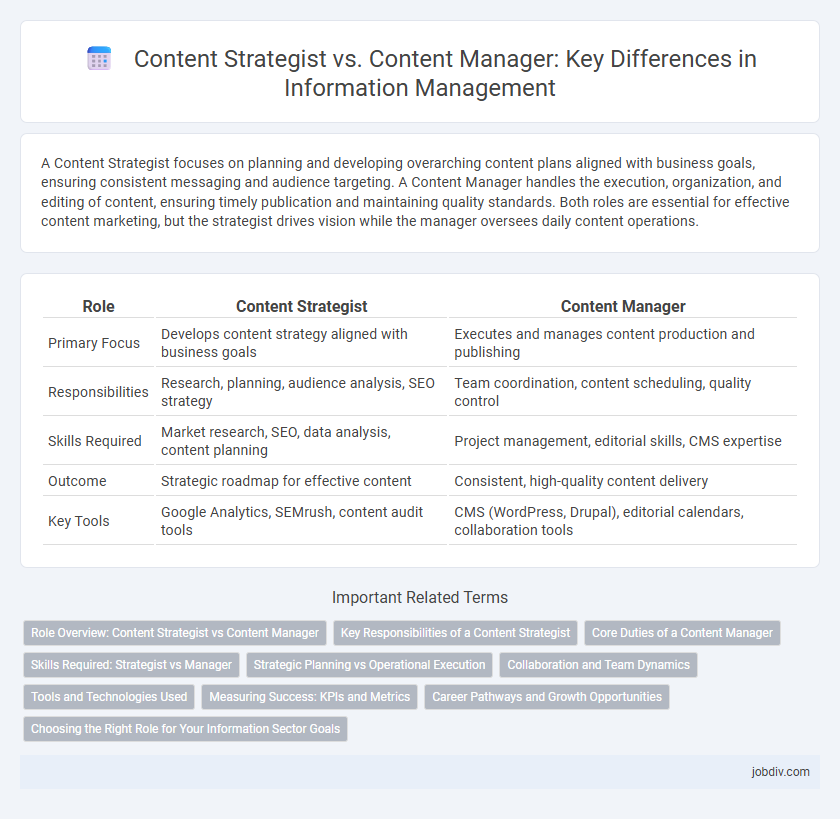A Content Strategist focuses on planning and developing overarching content plans aligned with business goals, ensuring consistent messaging and audience targeting. A Content Manager handles the execution, organization, and editing of content, ensuring timely publication and maintaining quality standards. Both roles are essential for effective content marketing, but the strategist drives vision while the manager oversees daily content operations.
Table of Comparison
| Role | Content Strategist | Content Manager |
|---|---|---|
| Primary Focus | Develops content strategy aligned with business goals | Executes and manages content production and publishing |
| Responsibilities | Research, planning, audience analysis, SEO strategy | Team coordination, content scheduling, quality control |
| Skills Required | Market research, SEO, data analysis, content planning | Project management, editorial skills, CMS expertise |
| Outcome | Strategic roadmap for effective content | Consistent, high-quality content delivery |
| Key Tools | Google Analytics, SEMrush, content audit tools | CMS (WordPress, Drupal), editorial calendars, collaboration tools |
Role Overview: Content Strategist vs Content Manager
Content Strategists focus on planning and developing content frameworks aligned with brand goals and audience needs, emphasizing research, data analysis, and long-term vision. Content Managers oversee the execution, organization, and publishing of content, ensuring consistency, quality, and timely delivery across platforms. Both roles require collaboration but differ primarily in strategy formulation versus operational management.
Key Responsibilities of a Content Strategist
A Content Strategist focuses on researching audience insights, developing content plans aligned with business goals, and defining editorial guidelines to ensure brand consistency. Their key responsibilities include analyzing content performance data to optimize engagement and coordinating cross-functional teams to execute cohesive content strategies. By prioritizing user experience and SEO best practices, Content Strategists drive long-term growth and enhance the overall content effectiveness.
Core Duties of a Content Manager
A Content Manager oversees the planning, creation, and distribution of digital content to ensure consistency with brand guidelines and marketing goals. Core duties include managing content calendars, coordinating with writers and designers, and analyzing content performance metrics to optimize engagement. They also ensure content aligns with SEO best practices and maintains quality across all platforms.
Skills Required: Strategist vs Manager
Content Strategists require strong analytical skills, mastery of SEO, and the ability to develop long-term content plans aligned with business goals, emphasizing audience insights and market research. Content Managers focus on project management, team coordination, editorial calendar maintenance, and ensuring content production meets quality and deadlines. Both roles demand expertise in content marketing and communication, but strategists prioritize strategic vision while managers excel in execution and operational skills.
Strategic Planning vs Operational Execution
Content Strategists focus on strategic planning by analyzing market trends, audience insights, and brand goals to develop long-term content frameworks. Content Managers specialize in operational execution, overseeing content creation, distribution schedules, and performance tracking to ensure alignment with strategic objectives. The synergy between strategic planning and operational management drives effective content marketing outcomes.
Collaboration and Team Dynamics
Content Strategists and Content Managers collaborate closely to align brand messaging with execution processes, ensuring cohesive storytelling and audience engagement. While Content Strategists focus on long-term planning and setting goals, Content Managers oversee day-to-day content production and team coordination. Their dynamic interaction fosters efficient workflow, combining strategic vision with operational management to optimize content impact.
Tools and Technologies Used
Content Strategists leverage analytics platforms like Google Analytics and SEMrush for audience insights and content planning, alongside project management tools such as Trello or Asana for workflow organization. Content Managers primarily utilize CMS platforms like WordPress or Drupal to execute content publication and editing, combined with social media management tools like Hootsuite or Buffer for distribution and engagement tracking. Both roles incorporate SEO tools like Ahrefs or Moz to optimize content performance and drive organic traffic.
Measuring Success: KPIs and Metrics
Content Strategists focus on measuring success through KPIs like audience engagement, brand awareness, and content reach, ensuring alignment with overall business goals. Content Managers emphasize operational metrics such as content production efficiency, publication frequency, and workflow optimization to maintain consistent quality and deadlines. Both roles analyze data from tools like Google Analytics and social media insights to refine strategies and improve content performance.
Career Pathways and Growth Opportunities
Content Strategists focus on developing overarching content plans and analyzing audience insights to drive brand messaging, while Content Managers oversee content production, coordinate teams, and ensure project deadlines are met. Career pathways for Content Strategists often lead to roles like Content Director or Chief Marketing Officer, emphasizing strategic leadership and data-driven decision-making. Content Managers typically advance to senior management positions such as Content Marketing Manager or Digital Marketing Manager, where operational expertise and team management skills are crucial for growth.
Choosing the Right Role for Your Information Sector Goals
A Content Strategist defines the overarching content approach by analyzing target audiences, market trends, and content performance metrics to align with business objectives in the information sector. In contrast, a Content Manager oversees daily content production, ensuring consistency, quality control, and timely delivery across multiple platforms. Selecting the right role depends on whether your organization needs strategic planning expertise or hands-on content execution to achieve specific information-driven goals.
Content Strategist vs Content Manager Infographic

 jobdiv.com
jobdiv.com